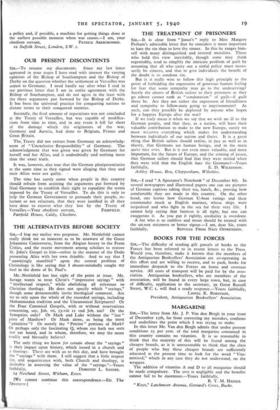THE TREATMENT OF PRISONERS
SIR,—It is clear from " Janus's " reply to Miss Margery Perham's admirable letter that he considers it more important to hate the sin than to love the sinner. In this he ranges him- self with many distinguished and revered moralists. Those who hold this view inevitably, though some may think regrettably, tend to simplify the intricate problem of guilt by assuming that all who carry out a sinful policy must neces- sarily be sinners, and that to give individuals the benefit of the doubt is to condone sin.
But is it really wise to follow this high principle to the point of forbidding the expression of generous human feeling for fear that some sympathy may go to the undeserving? Surely the cheers of British sailors to their prisoners as they go ashore cannot rank as " condonation " of guilt—if guilt there be. Are they not rather the expression of friendliness and sympathy to fellow-men going to imprisonment? As such, can they possibly be deplored by anyone who hopes for a happier Europe after the war?
If we truly mean it when we say that we wish no ill to the German people, and that they, as a nation, will have their valuable contribution to make to the new Europe, surely we must welcome everything which makes for understanding between individuals of our nation and theirs. It is a great thing that British sailors should realise, in fact as well as in theory, that Germans are human beings, and in the main Quite nice ones. But is it not even more valuable, and more important, for the future of Europe, and the coming of peace, that German sailors should find that they were misled when they were told that the English hate the Germans?—Yours Ashley House, Box, Chippenham, Wiltshire.


































 Previous page
Previous page